can #curl send a request that's stored in a a text file?
GET /yadayada HTTP/1.1
Host: blahblah.com
can #curl send a request that's stored in a a text file?
GET /yadayada HTTP/1.1
Host: blahblah.com
The Railway Museum in York is doing a fantastic thing collecting oral histories of LGBTQIA+ people connected with the UK railway (and Eurostar) - I thought this might be of interest to a few folk here! 
railwaymuseum.org.uk/research-…
#LGBT #LGBTQ #LGBTQIA #TransOnTrains
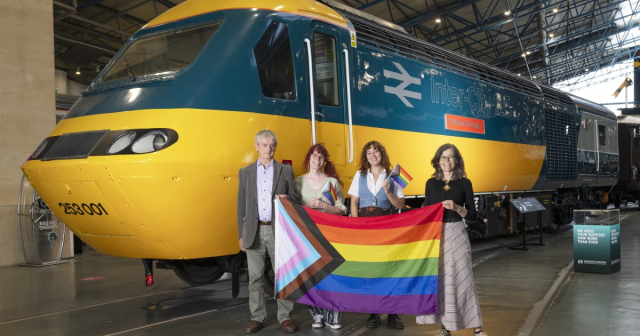
The National Railway Museum is embarking on a new project to record the stories and memories of the LGBTQIA+ community in a new oral history archive. Do you know somebody who would be interested?National Railway Museum
In 2011, Aaron Swartz was arrested after he downloaded millions of academic journal articles from JSTOR via the MIT network. He was charged under federal laws (including wire fraud and violations of the Computer Fraud and Abuse Act) with up to 13 felony counts, carrying the possibility of decades in prison, large fines, and other penalties. These federal charges eventually led to his death in 2013.
No AI company was ever charged under federal laws.
icy.wyvern.rip/notes/ad9ptt2s9…

Wenn in Kürze die Entscheidung fällt, ob Europa eine verpflichtende Chatkontrolle bekommt, ist auch die Haltung der Bundesregierung maßgeblich. Doch der Digitalminister mag sich lieber nicht positionieren.netzpolitik.org
The future of video doesn’t belong to platforms. It belongs to people.
We’re building a PeerTube co-op: a member-owned, democratically governed video platform based in BC. No algorithms deciding what matters. No corporate choke points. No waiting for permission.
This is about taking control of the infrastructure, the governance, and the culture—and doing it together.
Because co-ops give people ownership, governance rights, and collective resilience. Instead of handing data and control to a platform, members pool resources, share decision-making, and shape policies together.
BC has a strong legal framework for co-operatives, which makes it a natural place to explore this seriously.
PeerTube is federated, open-source, and already battle-tested as a decentralized alternative to YouTube. It’s not perfect—but it provides a solid foundation for a co-op structure to build on top of.
The idea is to pair federated tech with co-operative governance, so neither corporate control nor a single admin dictates the rules.
Right now, this is being organized by me (@atomicpoet) and @Crissy, along with a growing group of interested folks: creators, privacy advocates, security experts, and co-op thinkers from around the world.
We’re still early—think founding conversations, not bylaws and board elections. But the energy is real.
What follows is the proposed model, not something set in stone. The final structure will be decided by the member-owners once the co-op is formed.
The idea is to keep membership affordable for individuals while ensuring the co-op is financially sustainable from the start—with no ads, no data harvesting, and no outside investors. Just members pooling resources to run the platform together.
At scale, with a typical user mix (80 % base / 15 % medium / 5 % heavy), this works out to about C$6.90 per member per month, which comfortably covers hosting and operational costs.
There’s also a one-time buy-in of C$50, which funds initial setup (domain, CDN deposits, buffer) and helps keep the early months profitable without raising dues. When spread over the first year, that’s roughly C$4.17/month in effective cost coverage.
The financial and technical model is step-wise, not linear. As membership increases, transcoding nodes, storage/CDN tiers, and egress commitments scale at defined traffic thresholds.
The co-op’s development will unfold in three phases, with member-owners deciding collectively when to move from one to the next.
No. Technical expertise is welcome but not required. Governance, policy, communications, creative, and community-building skills are just as valuable. Infrastructure will be professionally managed, with costs shared through dues.
The proposal uses managed hosting as a baseline, scaling as membership grows. This provides reliability early on while retaining the ability to self-host more components later.
Moderation scales with user base and federation breadth:
The proposal starts with a curated allowlist of trusted instances to control load.
It will also:
As membership grows, federation posture can be revisited by member-owners.
We’re not working toward rigid dates—we’re building deliberately, in three clear phases:
Each phase builds on the last, and decisions about when to transition between them will be made collectively by member-owners.
Egress and bandwidth dominate, not storage. P2P offload reduces egress as viewer concurrency rises, but outbound data remains the biggest expense.
At as few as five members, the co-op becomes cash-flow positive, and margins scale significantly with growth.
Yes. The initial bylaws and governance structure will include clear documentation. New members will be onboarded through AGMs, published policies, and transparent reporting, as required under BC Co-operative Association law.
That will ultimately be up to the member-owners to decide collectively.
For now, tools like Google Docs are being used temporarily to get everyone aligned quickly. Yes, the irony isn’t lost—it’s like holding a union meeting in Jeff Bezos’ living room. But this is just to get the ball rolling, not a long-term choice.
We’re still defining this collectively, but the plan is to follow BC co-op regulations while ensuring member governance is meaningful, not symbolic. Expect conversations around:
Yes—very. Some participants are here primarily because they’re passionate about co-operatives, not necessarily PeerTube. That expertise will be crucial for getting the legal, organizational, and governance frameworks right.
Yes. As with most PeerTube instances, most viewing will be public, but uploading and policy decisions are reserved for member-owners. The co-op’s primary responsibility is to its members, while still providing an open and accessible platform for viewers.
The official name and branding will be chosen collectively by the founding member-owners after incorporation.
The next step will be setting up an initial coordination space (on open-source infrastructure, if members choose that path) to keep everyone looped in and start shaping this together.
If you want to be kept informed, reach out privately or share your email so you can be included when that happens.
Yes. But the response so far has been incredible. The mix of skills and motivations showing up this early—technical, organizational, privacy, cultural—is exactly what’s needed to make something real.
This is still early days. But something’s forming—a group of people who see the cracks in the platform world and want to build something better, together.
If that resonates with you, you’re welcome here.
#PeerTubeCoop #PeerTube #Cooperative
RE: atomicpoet.org/objects/2289eb4…

Tired of YouTube calling all the shots? It’s time to build something better—together.Here’s the slide deck for a proposal to launch a PeerTube co-op.Right now, there are three of us ready to get th...atomicpoet.org
US farmers are saying they "just need temporary help, until things get better."
Here's the thing. US farm exports- which are mostly soy- CANNOT get better.
Other countries expanded their soy industries to fill China's demand.
We've walled ourselves out of the global market, folks. This is it.
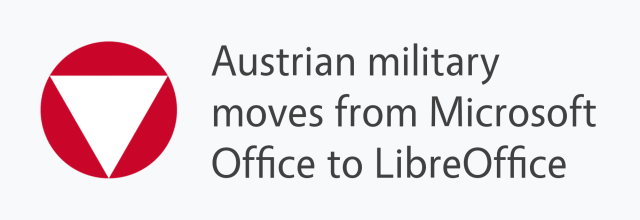
Like we’re seeing in Schleswig-Holstein, Denmark and many other government bodies and organisations, the Austrian military (Bundesheer) has migrated 16,000 PCs from Microsoft Office to LibreOffice.Mike Saunders (The Document Foundation)
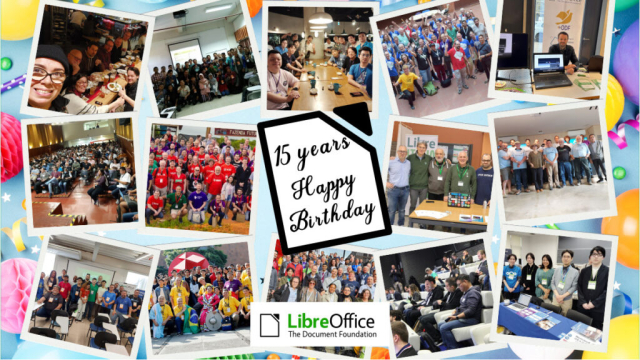
Fifteen years ago, we announced our ambitious plan to provide the world with a fully free and open office suite created by and for the community.Italo Vignoli (The Document Foundation)
Sensitive content
I have a question for photographers today, more for digital than film.
How do you feel about camera technology over the past decade? It feels to me they're making cameras better and better for video, but are they advancing features for still photography at the same rate?
What new developments in camera tech have been your favourite when it comes to still photography?
#photography #ReImaginePhotography #EwenTube
I'll be talking about the replies on an upcoming video!
A lot have plateaued. The big change is the phasing out of SLR from the two lasting major vendor: Canon and Nikon. But it seems that about 24MPix-ish (my 5D MkII do that) is pretty much standard for full frame or APS-C with the more (40-ish) high-end having more.
Indeed the hybrid photo / video has been probably the biggest evolution. But it's gonna plateau soon.
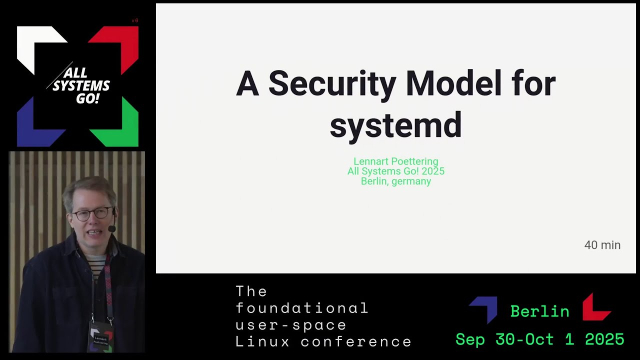
https://media.ccc.de/v/all-systems-go-2025-354-a-security-model-for-systemdLinux lacks a coherent security model, and by extension we never defined one for t...YouTube
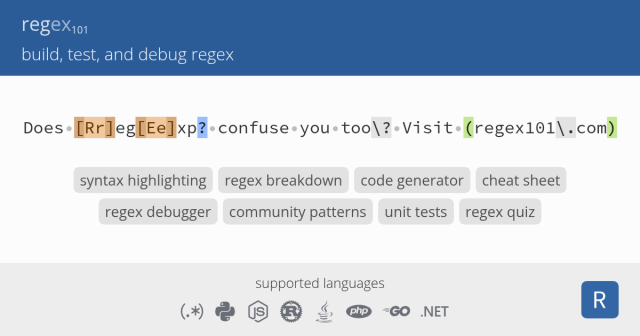
Regular expression tester with syntax highlighting, explanation, cheat sheet for PHP/PCRE, Python, GO, JavaScript, Java, C#/.NET, Rust.regex101
LOLOL
"I had a lot of trouble with HTTP Signatures. Because they are cursed and I cannot read documentation. But mostly the cursed thing."
daniel:// stenberg://
in reply to joriki • • •